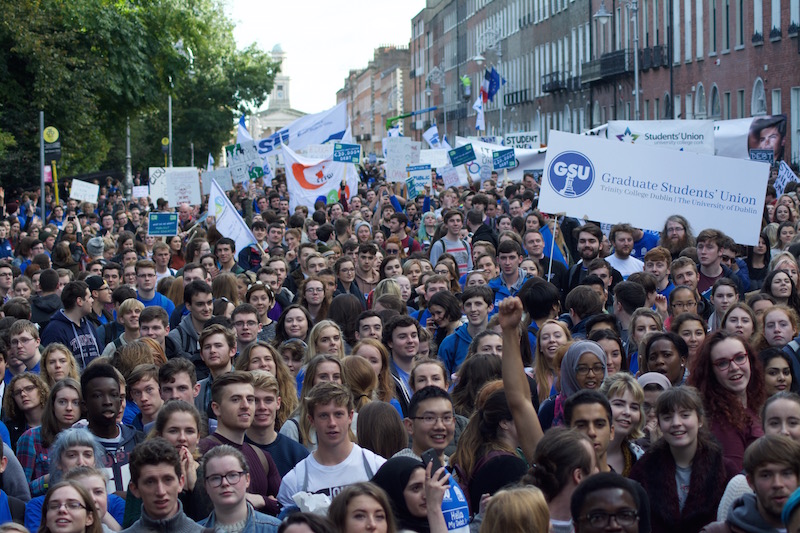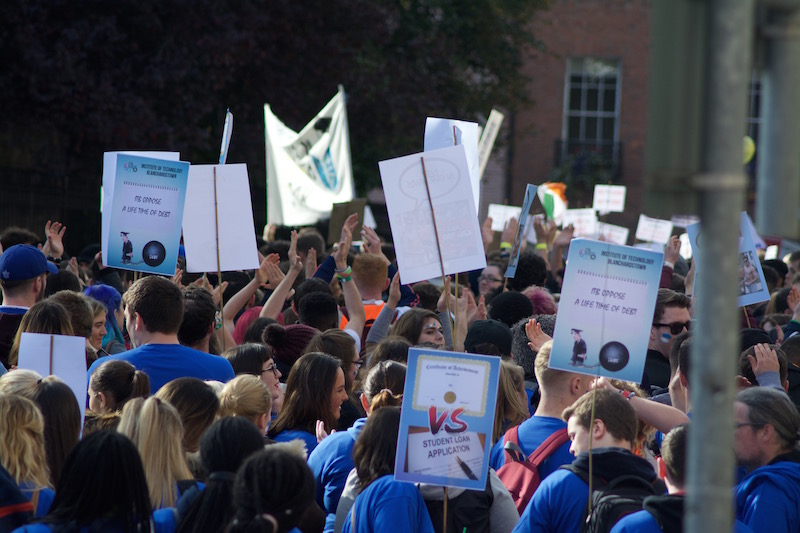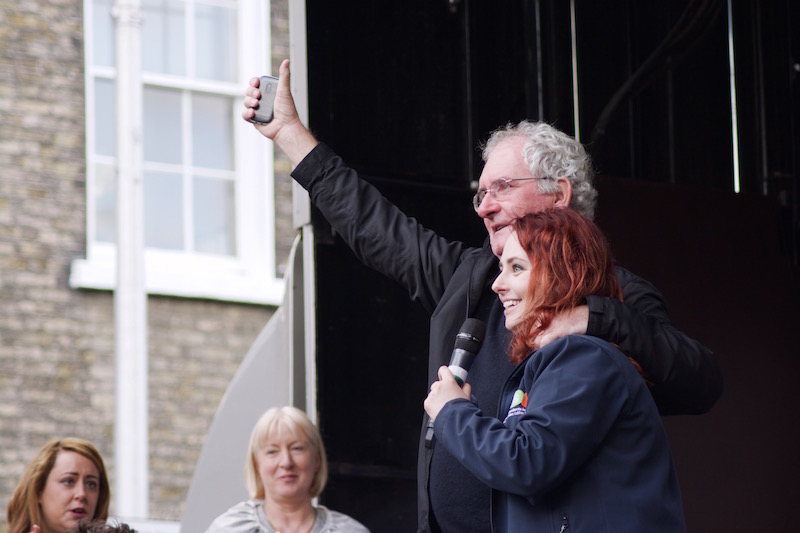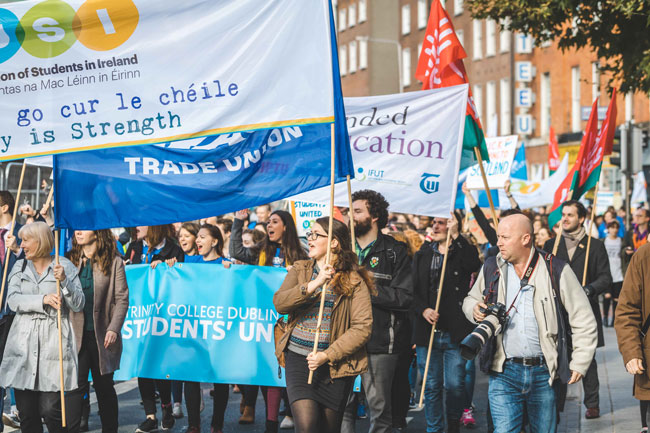Between 8,000 and 10,000 students, trade union representatives and interest group members gathered today at the Garden of Remembrance as part of the annual March for Education in protest against the continued undercutting of funds to higher education and to urge the Oireachtas Education and Skills Committee to consider a public funding model.
While Union of Students in Ireland (USI) had estimated that 5,000 students would attend the march, this number has been well exceeded, with the student delegation backed by representatives from groups including Irish Federation of University Teachers (IFUT), the Teachers Union of Ireland (TUI), Impact Trade Union, National Youth Council of Ireland (NYCI), Transgender Equality Network Ireland (TENI), ReachOut, the Irish Nurses and Midwives Organisation (INMO) and the Irish Rugby Union Players Association.
With Trinity College Dublin Students’ Union (TCDSU) estimating their delegation at 1,250 students, they met in Front Square before the March for Education ahead of joining the main delegation. Addressing students from the steps of the Exam Hall, TCDSU President, Kieran McNulty, worked to create an energetic atmosphere. Speaking to The University Times last night, McNulty said: “I think this year is especially important because we won’t have the chance again. There won’t be this amount of preparation time or this amount of consensus.”
Why they’re marching
Student leaders, trade union leaders and interest groups explain why they are marching today
Also speaking in Front Square this afternoon, the Vice-Provost, Prof Chris Morash, though acknowledging that though he and McNulty may not agree on the kind of funding they want, “there has to be more government investment”. He referred to his history of protesting, saying, “I did it because I believe in the value of education”, and noted that today there’s a sense that “I’m still marching.”
While McNulty was reluctant to commit to an estimation last night, TCDSU’s expectations were certainly exceeded, as were those of the other unions present. Galway-Mayo Institute of Technology (GMIT) SU President, Amy Kelly, told The University Times that they had 500 students present, noting that “this shows the government that students are to be taken seriously, and GMIT students are to be taken seriously”. Limerick Institute of Technology Students’ Union (LITSU) President, Mairéad Kelly, was similarly optimistic given their turnout of 550, saying that “a collective voice is what gets change”.

Athlone Institute of Technology Students’ Union (AITSU) President, Kevin Ronan, told The University Times that their delegation was similarly around 450. Speaking to The University Times, Dublin Institute of Technology Students’ Union (DIT SU) President, Boni Odoemene, estimated his delegation to be over 1,000 students, while Queen’s University Belfast sent down a small but hugely symbolic delegation of 40, significant for the fact that their funding system is different to that of Irish universities.
Possibly the most stunning statistic was from Carlow College, St Patrick’s Students’ Union President, Adam Clarke, who told The University Times that their 48-student delegation was around 11 per cent of their student population. He continued: “We had a bus full of super dedicated students, and I couldn’t be more proud.”
The large turnout from unions was motivated by the threat of the introduction of student loans as presented as one option within the Cassells report, as well as the ongoing systematic underfunding of Irish higher education institutions.
Speaking to The University Times, Dylan Nic Gabhann, President of Letterkenny IT Students’ Union (LYITSU) said: “This is one of the most important days in student history … this is unacceptable, it is complete extortion of students … the poorest of the poor are going to suffer the most.”
“In Letterkenny, we have the highest numbers of grants and mature students in the country, and that is why is why we are here in such large numbers today”, he added.

Dillon Grace, President of Maynooth Students’ Union (MSU), stated: “Today is a very important day. It is a chance for the government to hear the voice of students and their constituents … It will only affect this generation but many generations to come after us”
Speaking to The University Times, the President of the Irish Second-Level Students’ Union (ISSU), stated: “We believe in education without barriers and no student loans. We want fair and equal access to all students now and in the future.” Speaking to the crowd in Merrion Square, the President said: “We will always believe in an education system without barriers … I want a future. I want the chance to stay in Ireland and study in Ireland.”
“There is no justification for a scheme that will limit access to education … Let’s not deplete the number of mature and part-time students who study in our universities”, she continued.
These students’ unions were joined by public figures, trade unions and other groups including mental health and LGBT organisations. Mike Jennings, General Secretary of IFUT, speaking to The University Times said the organisation is “100 per cent behind the campaign for a significant increase in higher education funding and remaining funded through progressive taxation”.
Impact lead organiser, Joe O’Connor, said to The University Times that: “We are here together totally in agreement with USI, who we’ve been working with for the last few months. The government have the tendency to talk big and act small when it comes to education and we need to push them to back their promises up with the levels of investment required. They’ve been kicking the can down the road for far too long, and staff and students are acting now.” O’Connor is also a former USI president and member of the Cassells report working group.

USI President, Annie Hoey, calls her dad up on stage in Merrion Square, stating “this is the man who made my education possible”.
Speakers were heavily critical of any moves to introduce a loan scheme. Blindboy Boatclub, one half of hip-hop comedy duo the Rubberbandits, addressed the crowd: “Let’s not create education lines defined by class and how much money you have.”
“Education is a human right, it’s that simple”, he added.
The varied delegations on the streets, taking in members of universities, trade unions and impassioned members of the public, demonstrate how this march is more of a national campaign than a student-led one. Speaking to The University Times, USI President, Annie Hoey, said: “It’s significant in that it’s not just students here, it’s parents, staff, trade unions, the general public are all calling for the same thing: for the government to make a historic decision and to invest in education, to make it publicly funded because it’s a public good.” She continued: “We do not believe in burdening students with a lifetime of debt before they’ve even stepped out of the graduation hall.”
In an emotional address to the crowd, Hoey asserted that “education is not a burden on society. Education is an investment”, continuing on to ask: “How dare they toy with our futures? How dare they play the sympathy card saying they can’t afford it?”.
Bringing her dad on stage, Hoey stated that “this is the man who made my education possible”, continuing: “We have thousands of people and voters here today, and you need to go and make sure our government know we won’t take this anymore. We need degrees, not fees.”
Correction: 14:30, January 25, 2015
An earlier version of this article incorrectly attributed a quote from Annie Hoey to Blindboy Boatclub.







